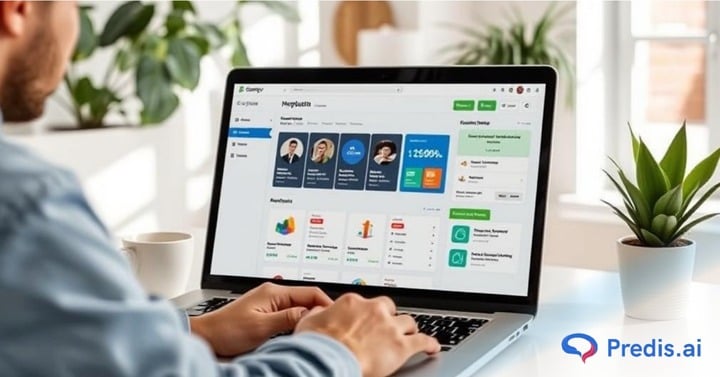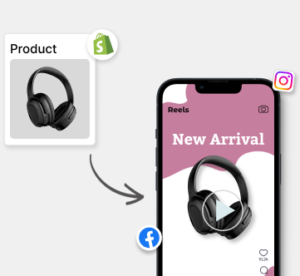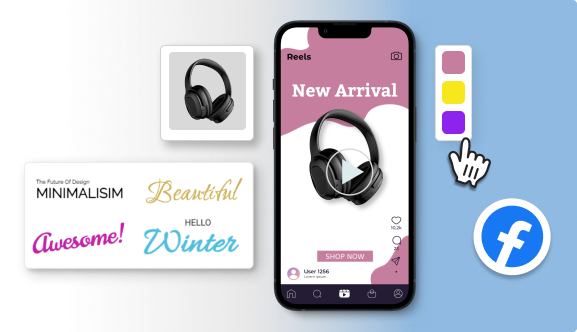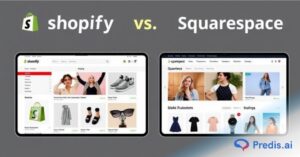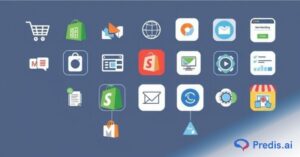Running a Shopify store is exciting but also challenging. Managing inventory, marketing, and customer engagement can feel overwhelming. That’s where marketing automation for Shopify comes in as a game-changer.
With customers expecting personalized experiences and instant responses, relying solely on manual efforts can quickly become overwhelming. That’s where marketing automation comes in as a lifesaver. It helps you simplify tasks, nurture customer relationships, and increase sales – all without burning out.
Imagine setting up workflows that send personalized emails, follow up with customers who abandoned their carts, and even reward loyal buyers with targeted discounts – all on autopilot. Automation doesn’t just save time; it empowers you to scale your business without compromising on quality or efficiency.
In this blog, we’ll explore how marketing automation can transform your Shopify store. From understanding the benefits to uncovering the best tools for the job, we’ll guide you through every step of the process. Ready to unlock the full potential of your Shopify store? Let’s get started!
What is Marketing Automation for Shopify?
Shopify is a leading e-commerce platform that empowers businesses to create, manage, and scale online stores. In simpler terms, Shopify is a subscription-based sales platform that operates as software-as-a-service (SaaS).
While Shopify excels at handling the technical side of e-commerce, marketing is where many store owners face challenges. That’s where marketing automation for Shopify comes into play.
Marketing automation refers to the use of tools and technology to streamline repetitive marketing tasks. It allows Shopify store owners to automate everything from email campaigns to cart recovery messages, loyalty programs, and customer segmentation. With automation, you can focus more on growing your business while still delivering a seamless customer experience.
Why Automate Marketing on Shopify?
Running a Shopify store involves a mix of creative and operational tasks. As your store grows, managing customer interactions, campaigns, and follow-ups manually becomes nearly impossible. Automating these processes ensures consistency, saves time, and keeps your store operating at its best.
Marketing automation for Shopify is all about streamlining business processes, maximizing efficiency, and optimizing resource utilization. Its purpose is to save valuable time and effort for companies.
By leveraging best marketing automation software, businesses can establish a robust and error-free marketing strategy. These tools offer a plethora of possibilities, including:
- Audience Segmentation: Divide your target audience into distinct groups based on various criteria.
- Personalized Messaging: Craft tailored messages for customers, taking into account their specific segment.
- Centralized Customer Database: Maintain a unified and comprehensive database of customer information.
- A/B Testing: Conduct experiments with different marketing approaches to determine the most effective strategies.
- Task Automation: Automate repetitive tasks, freeing up time for more critical activities.
- Analytical Insights: Gain valuable insights into marketing campaigns and customer behaviors through analytics.
Benefits of Marketing Automation for Shopify
- Time-Saving
Automation takes over repetitive tasks like sending emails or scheduling social media posts. This frees up time for you to focus on other crucial areas, like strategizing or expanding your product line. - Personalized Customer Experiences
With automation, you can tailor content to individual customer preferences. Whether it’s recommending products based on past purchases or creating targeted offers, personalization becomes effortless. - Boosts Sales and Conversions
Abandoned cart emails, upsell campaigns, and exclusive discounts can be automated to reach the right audience at the right time. This directly leads to increased sales and customer retention. - Consistent Engagement
Automation ensures you never miss a beat when it comes to staying in touch with your customers. Regular, scheduled communications build trust and keep your brand top of mind. - Cost-Effective Growth
Hiring a large team to handle marketing manually can be expensive. Automation tools allow you to scale your marketing efforts without increasing operational costs. - Data-Driven Insights
Marketing automation platforms provide detailed analytics and reports. This allows you to measure the effectiveness of your campaigns, understand customer behavior, and refine strategies for better results. - Seamless Integration
Shopify’s extensive app ecosystem allows you to integrate various automation tools, making it easy to add powerful features to your marketing strategy.
Marketing automation isn’t just a luxury for Shopify store owners; it’s a necessity for staying competitive in today’s fast-paced e-commerce environment. By implementing these tools, you can create a seamless experience for your customers, drive sales, and ensure sustainable growth for your business.
Next, let’s learn how one can implement marketing automation for Shopify and take your store to the next level!
How to Implement Marketing Automation For Shopify?
Implementing marketing automation for your Shopify store is all about being strategic. From setting goals to optimizing your efforts, it’s a process that requires thought and planning. Here’s how you can make it work for your business.
1. Identify Key Goals & Objectives for Automation
Before setting up automation, get clear on your goals. Do you want to boost sales, recover abandoned carts, or engage inactive customers? Pinpoint the areas that need attention and focus your strategy there.
Start by defining what success looks like for your store. Is it higher conversion rates or better customer retention? Knowing this will shape your automation approach.
Next, define your ideal customers. Understand their preferences, shopping habits, and pain points. Are they bargain hunters or loyal repeat buyers? Tailor your campaigns to match their needs.
Finally, plan how to achieve these objectives. For example, use automated cart recovery emails for abandoned carts or personalized offers to keep customers engaged. Setting clear goals and understanding your audience ensures your automation efforts deliver meaningful results.
2. Choose the Right Shopify Automation Tool
Picking the right automation tool can make or break your Shopify store’s marketing strategy. The right tool saves time, boosts efficiency, and ensures seamless integration with your store.
Start by assessing your needs. Do you need help with social media marketing, cart recovery, or personalized recommendations? Match your requirements with a tool’s features to ensure it meets your goals.
Look for ease of use. A good tool should be user-friendly, with a simple interface that saves time instead of adding complexity. Scalability is also key – choose a tool that grows with your business.
Integration is a must. The tool should sync smoothly with Shopify, along with any other apps you use. Additionally, check for analytics features. Insights on campaign performance help you refine your strategy.
Budget matters too. Compare pricing plans to ensure the tool offers value without exceeding your budget. Many tools also offer free trials – test them to see if they fit your needs.
By choosing wisely, you’ll streamline your marketing efforts and set your Shopify store up for success. Leveraging platforms such as Shopify or its alternatives to build your online store can help to tailor the design for a cohesive branding across platforms.
3. Set Up Workflows & Automate Relevant Content
To streamline your Shopify store’s operations, start by identifying areas in the customer journey where automation can make a difference. Look for pain points like abandoned carts, delayed responses, or lack of post-purchase engagement. These are golden opportunities to improve customer satisfaction.
Automate repetitive tasks like welcome emails for new subscribers, inventory restock notifications, and post-purchase thank-you messages. For example, setting up an automated cart recovery email can bring back customers who left items in their cart. Automate repetitive tasks like welcome emails using email automation platform for new subscribers, inventory restock notifications, and post-purchase thank-you messages. For example, setting up an automated cart recovery email can bring back customers who left items in their cart. Similarly, personalized thank-you emails after a purchase can build loyalty. You can also use inventory reporting software to track stock levels in real time and automatically trigger restock alerts, helping you avoid missed sales and improve overall store efficiency.
Getting started with marketing automation on Shopify is easier than you think. Shopify offers several automation tools and apps designed to simplify your workflows. Tools like Klaviyo integrate seamlessly, enabling you to create and customize workflows in just a few clicks. Start small by automating one process, test its effectiveness, and gradually expand your efforts.
By automating these tasks, you’ll save time, reduce errors, and deliver a smoother experience for your customers. Remember to review your workflows regularly to ensure they stay relevant and effective.
Boost your online sales with engaging videos created using Predis.ai's Ecommerce Video Maker. Create scroll stopping social media product videos in a few clicks and improve your social media presence, convert more customers.
4. Cultivate an Engaged Audience List
Building a loyal and engaged audience is key to long-term success for your Shopify store. Start by creating an email list of customers genuinely interested in your brand. Use opt-ins like pop-ups, discounts, or exclusive access offers to encourage sign-ups. Regular email verification ensures your list stays clean and active, improving deliverability and engagement.
Focus on quality over quantity. An engaged audience is far more valuable than a large, uninterested one. Once you have a clean email list, nurture those relationships with personalized content. Share helpful tips, exclusive deals, or behind-the-scenes stories that align with their interests.
Segment your audience based on their behavior, such as purchase history or browsing patterns. This allows you to send targeted campaigns that feel relevant and personal. For example, if someone frequently buys skincare products, send them updates about new arrivals or special offers in that category.
Communication is key to keeping your audience engaged. Use email automation campaigns, social media posts, and even SMS to reach them where they are most active. Share exclusive offers, helpful tips, or updates about your store. For example, let them know about a limited-time sale or restocked items they’ve shown interest in.
Interactive content like polls or Q&A sessions can make your audience feel involved. Encourage feedback and listen actively. When customers see their input valued, it strengthens trust and loyalty. Remember, a well-nurtured audience isn’t just a customer base – they’re advocates for your brand, ready to spread the word and fuel your growth.
Automation tools simplify nurturing your audience. Automated workflows can segment customers, send personalized messages, and follow up at the perfect time. Marketing automation helps in building relationships with your audience while saving time and effort.
5. Strike a Balance by Monitoring and Optimizing
Automation is a powerful tool, but balance is key. Over-automating your Shopify store can make interactions feel robotic, alienating your audience. To create a winning strategy, combine automation with human oversight and regular optimization.
Keep an eye on your automated workflows and campaigns. Use analytics to track metrics like email open rates, click-through rates, and conversion rates. Identify what’s working and what isn’t. For instance, if a cart abandonment email isn’t bringing customers back, tweak its timing or offer.
While automation handles repetitive tasks, human interaction is still essential. Respond personally to customer queries, address concerns promptly, and show genuine care. A mix of automated messages and human touch creates a seamless experience.
The digital landscape is constantly changing, so don’t set and forget. Regularly review your automation settings to align with new trends or customer feedback. A/B test workflows, email subject lines, and promotional offers to find what resonates best.
Striking the right balance between automation and personalization ensures your business remains efficient and authentic. Monitor results, make adjustments, and continue delivering a great experience to your customers.
Key Areas for Shopify Marketing Automation
To effectively implement marketing automation for Shopify, it’s crucial to start by clearly defining your business goals. Once you have a solid understanding of your aim, the next step is to identify the most suitable technology that aligns with your strategy.
Let’s dive into the key areas where automation can make the most impact, along with tools to get the job done.
1. Email Marketing Automation – Klaviyo
Klaviyo offers a robust solution for setting up automated email workflows. Unlike being developed by Shopify, Klaviyo is a third-party tool that seamlessly integrates with your store. Its primary objective is to empower you to foster stronger customer relationships and drive increased sales.
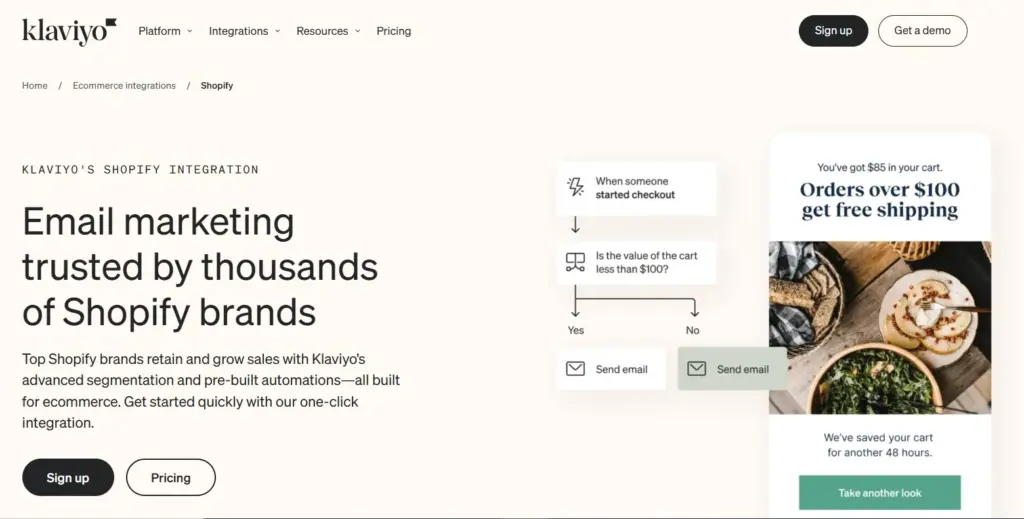
With Klaviyo, you gain the ability to create automated emails triggered by specific events effortlessly. For instance, you can set up emails to be automatically sent when a customer completes a purchase or abandons their cart.
Additionally, you can design emails to be dispatched at various intervals after visitors engage with your website or even when there has been a prolonged absence of activity. By leveraging Klaviyo’s features, you can effectively engage with your audience at critical touchpoints throughout their journey.
In simple words, Klaviyo empowers businesses to automate strategic email marketing throughout the customer journey. It keeps your brand top of the minds of your customers and builds a long-lasting customer-business relationship.
2. Customer Segmentation and Targeting – Shopify
Segmenting customers involves gathering specific data and analyzing it to identify patterns that can be used to create meaningful groups. This data can include various types of information, such as job titles, locations, or previous purchase history. Other insights can be derived from understanding how customers initially engage with your business.
For example, if you’re an online marketer with an opt-in email list, you can segment your marketing messages based on the specific opt-in offer that attracted each customer. However, acquiring additional demographic details like age and marital status may require alternative methods. One effective approach is using email verification tools to ensure your contact list is accurate and up-to-date, which improves deliverability and enhances segmentation efforts.
Shopify offers comprehensive segmentation tools designed to collect data directly from your online store’s traffic. By leveraging these tools, you can unlock valuable insights about your customers and create unique segments.
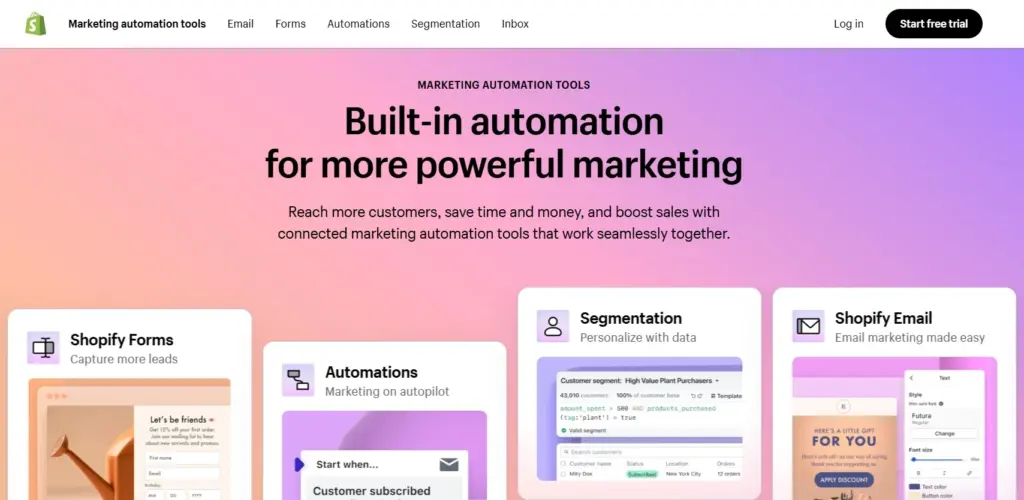
To simplify things, Shopify provides default customer segments and templates to kickstart your segmentation efforts. As your business evolves, you can refine, expand, or remove customer segments to adapt to changing needs and market dynamics.
3. Abandoned Cart Recovery – Gorgias
Improving the overall customer experience can significantly impact reducing cart abandonment rates for your business. Why is that? Customers rely on certain elements, such as a helpful FAQ page, transparent returns policies, and reliable customer support, to gather the necessary information and build trust before purchasing.
Gorgias is a dedicated customer service platform crafted to enhance the customer experience and drive revenue for e-commerce merchants. It offers a range of features tailored to help Shopify stores tackle cart abandonment effectively. Here are some of the key features:
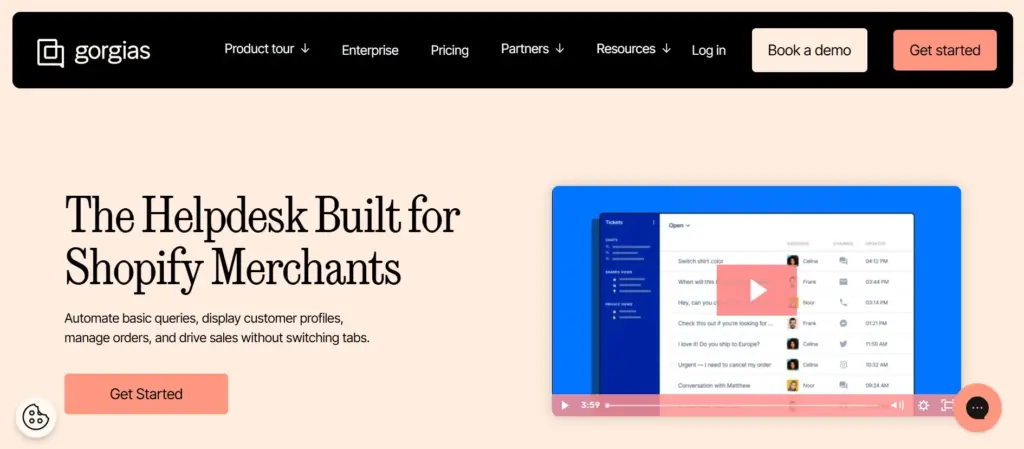
- Live chat: This feature enables proactive chat campaigns and targeted discounts, engaging customers who are lingering on a checkout page or have items in their cart for a specific period.
- Shipping and returns integrations: Gorgias integrates smoothly with shipping and returns systems, allowing you to offer hassle-free shipping options and the assurance of easy returns, which can boost customer confidence.
- SMS and email: In addition to serving as excellent support channels, SMS and email can be utilized for effective marketing campaigns. You can leverage these channels to send reminders and incentivize shoppers to complete abandoned purchases, thereby increasing conversion rates.
By leveraging Gorgias and its features, you can create a seamless customer experience that addresses pain points, builds trust, and encourages customers to follow through with their purchases.
4. Personalization and Customer Journey Mapping – WISER
By utilizing customer journey analytics, you can gain valuable insights into how different customer segments typically engage with your online store.
This analysis helps you identify areas where potential issues or gaps may exist, leading to bounce-offs or lost conversions. Furthermore, it enables you to implement smarter product recommendation strategies and customize the buying experience to drive higher conversion rates.
WISER, powered by machine learning and artificial intelligence, offers a robust recommendation engine that can process a vast amount of customer and product data points at scale. With the WISER Shopify app, you can analyze browsing patterns, preferences, order history, interests, and more to comprehensively understand your customers.
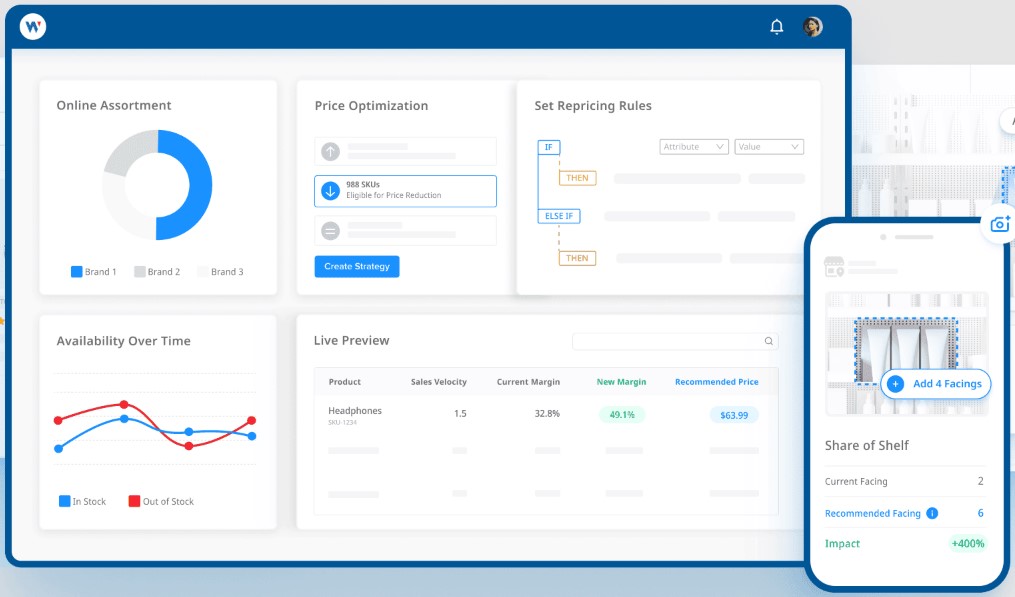
Leveraging this knowledge, you can deliver personalized shopping experiences across web, mobile, and email channels, resulting in potential conversion rate increases of up to 35%.
5. Social Media Marketing – Predis AI
You simply can’t afford to ignore social media in today’s digital landscape. Facebook alone boasts over 2.9 billion daily active users. The potential of social media to drive business growth is undeniable. It is undeniably a crucial component of a successful marketing strategy.
The good news is that social media marketing doesn’t have to be a daunting task. With the right tools at your disposal, you can maximize the impact of your social media campaigns while minimizing the time investment required. That’s where Predis AI comes in. It offers a comprehensive social media management solution, allowing you to scale your social media activities at an impressive 10X speed.
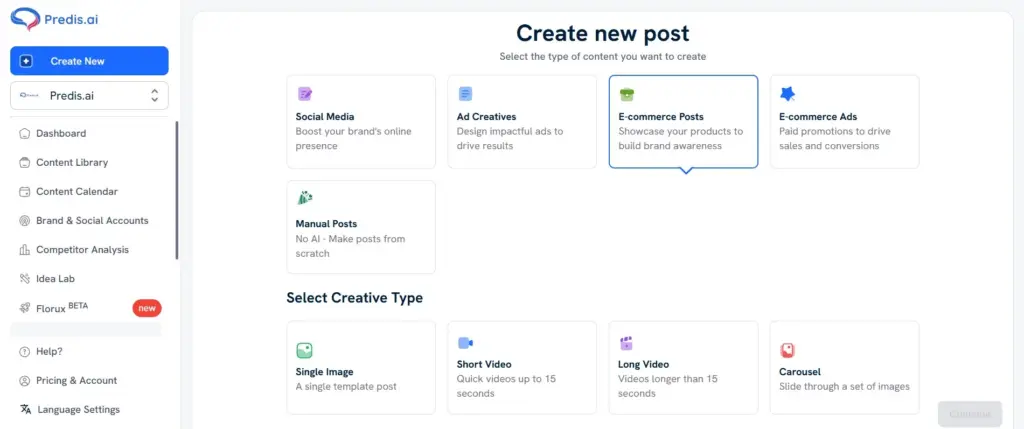
With Predis you can simply link your online store and start creating products posts and dropshipping ads from your product catalog. Predis makes it easy for stores to create, schedule, and post on social media through a single platform. For e-commerce brands handling large catalogs, automation becomes even more powerful when product posts are generated and published automatically across social channels. This approach removes manual effort while ensuring every product update reaches the right audience at the right time.
From creating captivating single-image posts to crafting engaging Instagram reels, Predis handles everything seamlessly based on your simple text input. The power of AI enables you to generate bulk content without sacrificing the professional touch you desire.
Additionally, Predis provides in-depth competitive analysis, offering valuable insights into the strategies that work for your competitors.
Predis equips you with the knowledge you need to improve your approach for better results. The platform acts as an analytical tool that ensures your social media efforts are not only creative but engaging as well.
Moreover, it helps you generate strategic content aligned with industry trends and competitor performance.
Go From Your Catalog to Social Media Posts in 60 Seconds with ease using Predis.ai's Ecommerce Social Media Post Maker - boost engagement and sales.
6. Customer Management – HubSpot
Shopify has gained widespread recognition for its user-friendly interface and exceptional adaptability, allowing businesses to scale their operations. However, an intriguing fact often overlooked is that integrating Shopify with a Customer Relationship Management (CRM) system can unlock even greater potential. Brands working with Salesforce often rely on professional Salesforce implementation services to connect Shopify with CRM workflows, ensuring data consistency, better customer visibility, and smoother automated engagement.
Sales CRMs serve as indispensable tools for eCommerce enterprises, providing a centralized platform that seamlessly combines sales, marketing, and customer service functionalities.
HubSpot is one such CRM solution, which is renowned for its ability to enhance sales and marketing processes for Shopify store owners. By leveraging its Shopify integration, HubSpot empowers businesses with comprehensive contact management, streamlined sales automation, and impactful email marketing capabilities.
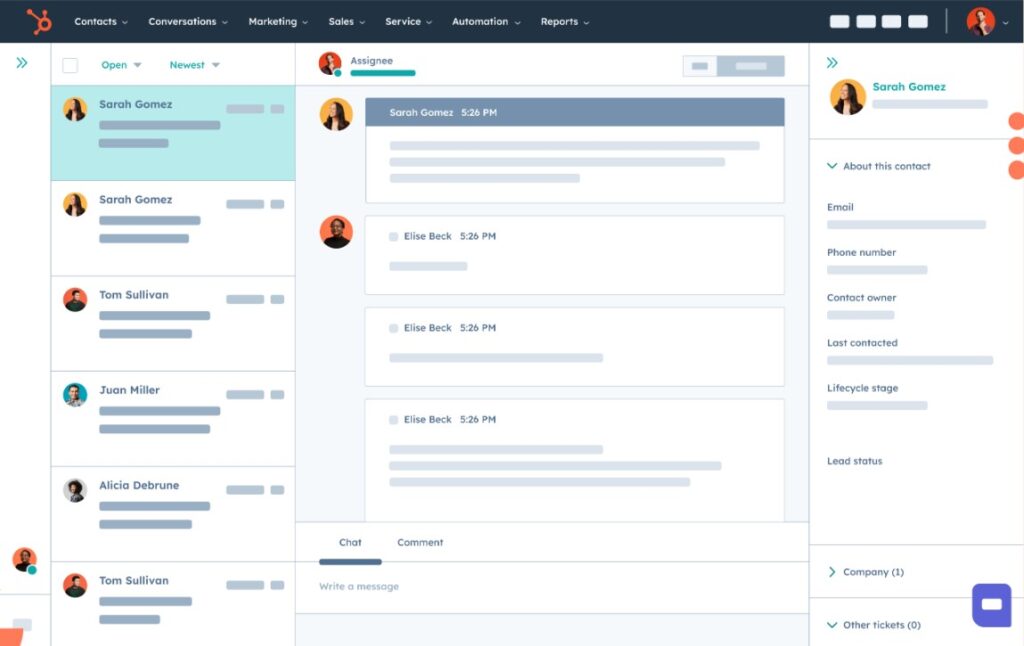
Through this seamless amalgamation, It monitors customer behavior, identifies promising leads, and nurtures customer relationships, fostering long-term loyalty and growth
Now that you’ve explored the key areas of marketing automation, it’s time to implement these strategies effectively. In the next section, we’ll discuss best practices for creating seamless, impactful automation workflows tailored to your Shopify store. Let’s dive in!
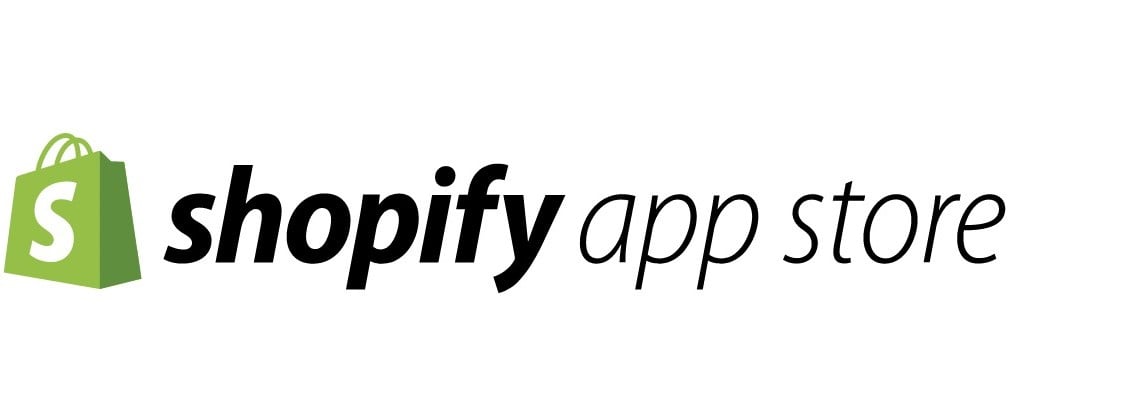
⭐️⭐️⭐️⭐️⭐️
“Great App! Would Recommend to anyone looking to boost their social media posts.”
Top Strategies for Effective Marketing Automation on Shopify
Setting up marketing automation for your Shopify store doesn’t have to be overwhelming. A few well-planned strategies can go a long way in boosting sales and improving customer relationships. Here are some best practices to guide you:
1. Start with Simple Workflows
Begin with the basics like welcome emails, order confirmations, and cart recovery reminders. These workflows are quick to set up and deliver immediate value. Starting small allows you to focus on efficiency and ensures your automations run smoothly.
2. Personalize Your Messaging
Automation doesn’t have to feel generic. Use customer data to tailor your communication. Adding names, recommending products, or sharing exclusive offers makes your messages more engaging and builds stronger connections.
3. Keep It Customer-Focused
Always put your customers first. Think about their needs and preferences while setting up automation. Avoid spamming with unnecessary emails. Instead, send updates or offers that genuinely add value to their shopping experience.
4. Monitor Compliance
Stay compliant with data protection laws like GDPR and CCPA. Make sure your emails include unsubscribe options, and let customers know how their data is used. Transparency builds trust and keeps your brand safe. Robust data protection and GDPR-compliant solutions can help businesses safeguard critical information effortlessly.
5. Use Shopify’s Built-In Features
Shopify has powerful automation tools you can use right away. From abandoned cart recovery to order updates, these features are easy to set up and integrate seamlessly with your store’s operations.
6. Incorporate Upsell and Cross-Sell Strategies
Boost your revenue by suggesting upgrades or complementary products. Automate these recommendations in emails or at checkout. A little nudge can encourage customers to add more to their cart.
7. Automate Post-Purchase Engagement
The journey doesn’t end after checkout. Set up follow-ups to thank customers, request reviews, or suggest related items. This keeps your brand top-of-mind and builds long-term loyalty.
8. Schedule Social Media Posts
Use automation tools to plan your social media updates in advance. Sync your Shopify store with platforms like Instagram or Facebook to share promotions, product launches, or customer shoutouts without manual effort.
9. Set Triggers for Key Actions
Triggers let you respond to specific customer behaviors. For example, send a discount code when a customer hasn’t purchased in a while. This type of timely outreach can re-engage shoppers effectively.
10. Analyze and Adjust
Automation isn’t a one-and-done deal. Regularly review performance metrics like click rates and conversions. Use these insights to refine your workflows and make them even more effective over time.
With the right practices, marketing automation can transform how your Shopify store operates. It saves time, enhances customer experiences, and drives growth. Next, we’ll summarize everything and tackle common questions in our FAQs section.
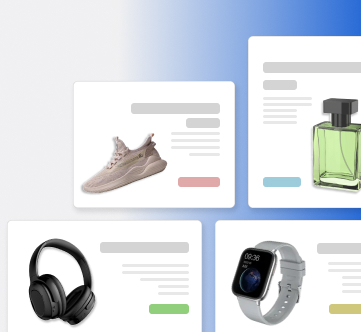
Conclusion
Implementing marketing automation for your Shopify store is more than just a time-saver – it’s a smart way to enhance your entire business strategy. Automation allows you to connect with customers on a deeper level, deliver personalized experiences, and drive targeted campaigns that truly make an impact. Whether it’s through abandoned cart recovery, upselling, or post-purchase engagement, the possibilities are endless.
By using the right tools and strategies, you’ll not only boost sales but also build stronger, long-lasting relationships with your audience. Marketing automation isn’t just about doing less; it’s about doing better. Start small, test regularly, and always keep your customer at the heart of your efforts.
Are you ready to take your Shopify store to the next level? Explore how marketing automation can transform your business.
Try Predis.ai today and unlock the potential of smarter marketing. Don’t wait – start your journey toward success now by signing up for an account!
FAQs
1. Can small Shopify stores benefit from automation?
Absolutely! Automation isn’t just for big brands. Small stores can use it to save time and focus on growth. It helps with tasks like sending personalized emails, recovering abandoned carts, and nurturing customer relationships – all without extra effort.
2. How much does marketing automation cost?
The cost varies depending on the tools you choose. Many platforms offer affordable plans tailored for small businesses. Shopify itself includes built-in features, and tools like Mailchimp, Klaviyo, and Predis.ai have budget-friendly options. You can start small and scale up as your business grows.
3. Is marketing automation difficult to set up for beginners?
Not at all! Most tools are designed to be beginner-friendly. They provide templates, step-by-step guides, and tutorials to make the process easy. Shopify’s built-in features are especially straightforward, so even first-timers can get started quickly.
4. How can I measure the success of my marketing automation?
Track metrics like open rates, click-through rates, conversions, and customer retention. Analyze these numbers regularly to see what’s working and what isn’t. Adjust your strategies based on the insights to keep improving results.
5. What should I avoid when setting up marketing automation?
Avoid overloading customers with too many emails or irrelevant messages. Keep your workflows simple and ensure each message adds value. Also, double-check your settings to prevent sending duplicates or unnecessary notifications.
6. Can I use automation for social media marketing?
Definitely! Automation can help you schedule posts, manage ad campaigns, and track engagement effortlessly. Tools like Predis.ai make it easy to keep your social media active and aligned with your overall strategy.
Related Articles
Best Size for Shopify Product Images
How to Advertise Amazon Products on Instagram?
Top Free Social Media Tools for Dropshipping in 2023
Tag Products on Instagram from Shopify


